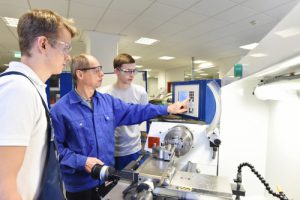
As co-chair of the Senate CTE Caucus, U.S. Sen. Todd Young (R-IN) helped advance a bipartisan compromise bill that updates the nation’s main career and technical education (CTE) law out of committee to the full Senate this week.
“Career and technical education programs have not been updated since 2006,” Sen. Young said. “Today’s bipartisan committee vote marks a major step in getting CTE reauthorization to the finish line.”
The Senate Health, Education, Labor, and Pensions (HELP) Committee on June 26 voted to advance the Strengthening Career and Technical Education for the 21st Century Act, H.R. 2353, out of the committee and back to the full Senate, which received H.R. 2353 the same day following voice vote passage by the U.S. House on June 22.
H.R. 2353 represents a bipartisan compromise to reauthorize the Carl D. Perkins Career and Technical Education Act and includes provisions that would better align with workforce needs and preserving accountability measures designed by states and localities, according to a summary provided by Sen. Young’s office.
H.R. 2353 also includes provisions related to several bills sponsored and introduced by members of the U.S. Senate CTE Caucus, including the SHOP CLASS Act, S.1501; the SUCCESS Act of 2018, S. 3081; the Perkins Fund for Equity and Excellence, S. 1004; and the Educating Tomorrow’s Workforce Act of 2017, S. 628.
“This legislation would update education and job training programs to align them with the current needs of our workforce, while still preserving accountability at the state and local levels,” said Sen. Young. “Bringing CTE into the 21st century is the key to providing Hoosiers with more opportunities for high-wage and high-demand jobs.”
Fellow Senate CTE Caucus Co-Chairs U.S. Sens. Tim Kaine (D-VA), Rob Portman (R-OH) and Tammy Baldwin (D-WI) also celebrated the Senate HELP Committee’s passage of H.R. 2353.
“We have waited years to address our policies’ shortfalls in preparing students for good, in-demand jobs,” said Sen. Kaine. “We need to invest in education training programs so we have more skilled workers in this country.”
Manufacturers and business owners in Kaine’s home state of Virginia say CTE programs are must-have solutions for creating jobs, retraining workers and ensuring all students are highly skilled. “That starts with exposing students to more career possibilities at a younger age and making sure we have the teachers to train them,” Kaine said. “This is a great step toward closing the skills gap and ensuring all our students are ready to compete in a global economy.”
Likewise, employers in Ohio also have stressed the need for more CTE to Sen. Portman. “Ohioans should have the chance to acquire the training needed for today’s jobs, and this legislation ensures that is possible, regardless of economic standing,” he said.
H.R. 2353 would reauthorize the law and provide direct funding to states and localities to prepare students for 21st century jobs, according to Sen. Young’s summary, which noted that half of all science, technology, engineering and math jobs currently require less than a bachelor’s degree, and health care occupations are expected to grow 18 percent by 2026.
Provisions in H.R. 2353 also would require states and localities to demonstrate alignment with economic needs and promote collaboration with workforce development boards and businesses, according to the summary.
At the same time, the U.S. Secretary of Education would not be allowed to dictate accountability standards to states, which would be allowed to determine their own levels of performance and to fund innovative initiatives that are locally designed, the summary states.
“It’s clear that we need to do more to support career and technical education so people are better equipped for the high-skilled jobs of today and tomorrow,” said Sen. Baldwin. “Career and Technical Education has shown to be one of the most effective ways to respond to our workforce readiness needs so I’m proud to work across party lines on this effort.”



